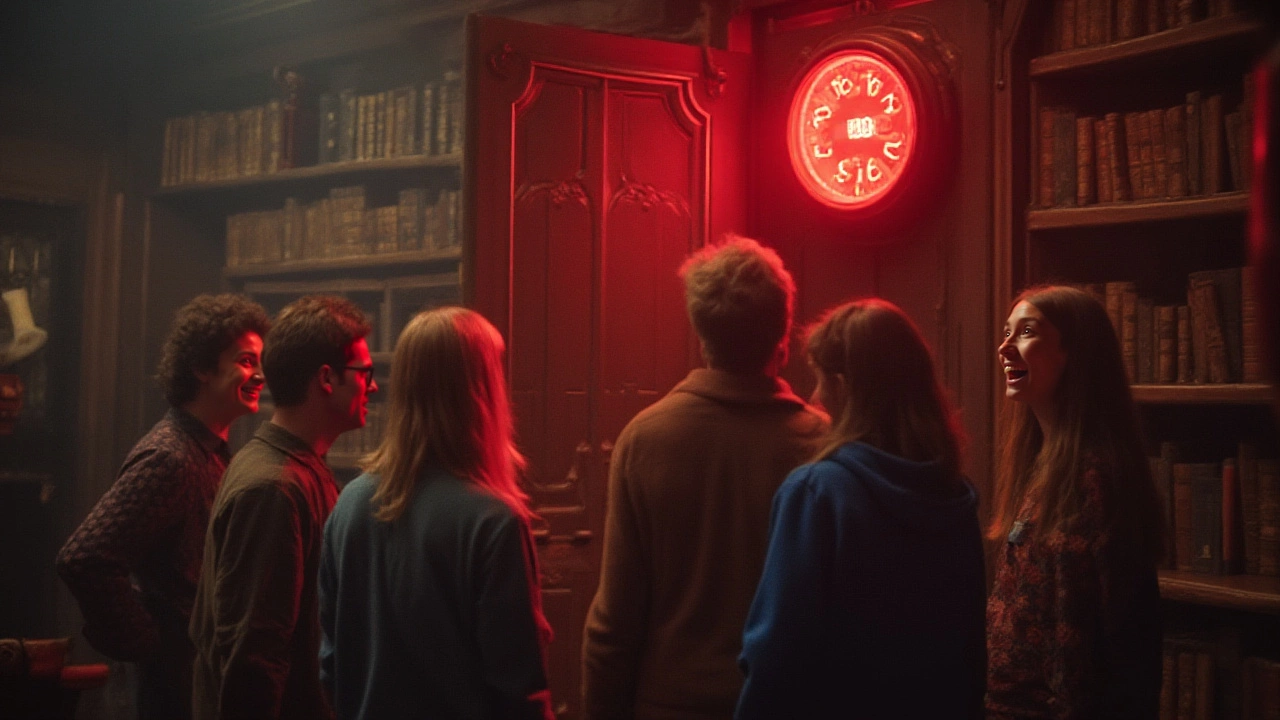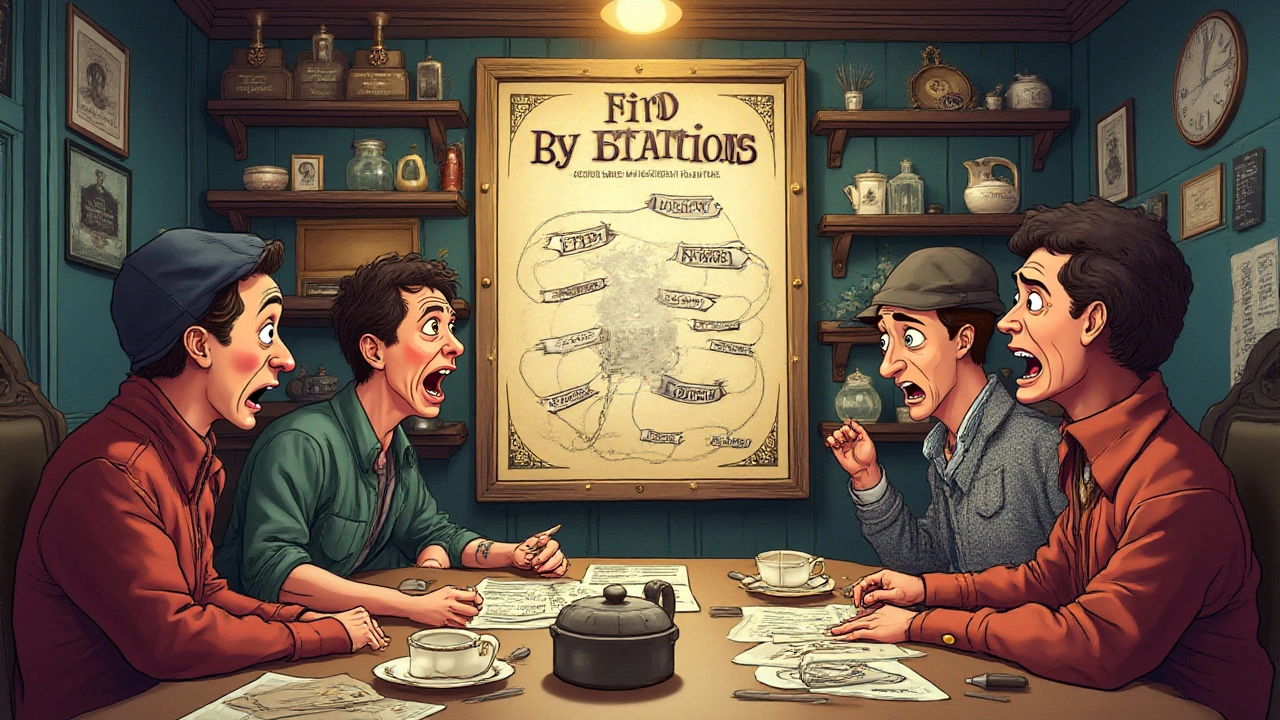What Really Happens If You Don't Finish an Escape Room: The Truth About Failing the Challenge
 Aug, 2 2025
Aug, 2 2025
Time’s ticking. You’ve got your team sweating, shouting out solutions, maybe knocking over a prop or two by accident. The clock hits zero and the puzzle’s not solved. Suddenly, everything stops. Or does it? The looming question isn’t about dropping the ball — it’s what really happens next if you don’t beat the escape room before time’s up. Do you get locked in? Do alarms go off? Or is it just an awkward group selfie with sad faces? Reality is equal parts surprising and practical, and it’s nothing like the thriller movies where walls close in. But missing the mark is more common than you think, with over 60% of groups failing to finish on time, according to an industry survey from 2024.
The Aftermath: What Happens When You Run Out of Time?
Let’s cut through the TV drama. No, you’re not going to be left banging on the door, and nobody's calling your grandma to confirm your identity. In most escape rooms, the game master — that’s the crew member watching you on cameras — steps in when the clock strikes zero. Usually, they enter the room, give you a warm smile, and announce, "Time’s up!" The switch from adrenaline-filled action to a chill debrief can be a jolt, but there’s nothing to fear. In fact, escape rooms have strict safety rules, especially in places like the US and UK. You’ll never be trapped for real. Safety codes make sure exit doors unlock, and emergency buttons are usually available.
Most venues have a little ritual after you run out of time. For example, at the famous London Escape Room center, staff spend a couple of minutes talking you through the puzzles you missed. If you’re close to the finish line, they might show you the final steps — a sort of backstage pass to their secrets. Sometimes, they hand over a hint-filled sheet (great for bragging or planning your comeback). And at many locations, you get a post-game chat where you can ask, “How the heck was I supposed to guess the answer to that riddle?” Bonus: about 35% of escape rooms take a team photo to mark your noble defeat, according to the Escape Room Industry Report for 2024. Some even give a consolation sticker: “I almost escaped!”
A quick tip for first-timers: Don’t focus too much on the ending. The real buzz comes from working together, arguing over clues, and those awesome lightbulb moments. Plus, messing up just gives you a better story to tell. The game master’s job isn’t to judge, but to ensure you had fun, learned a thing or two, and didn’t break the props (seriously, don’t break the props — some rooms fine you for it).

Behind the Scenes: Why Most Groups Don’t Escape (and Why That’s Okay)
Here’s a wild stat: in 2024, only about 35% of teams successfully complete escape rooms within the time limit. Surprised? You’re not alone. The rooms are designed to challenge your brain and teamwork under pressure, not to guarantee a win. Some rooms deliberately keep success rates low — sometimes as low as 10% for the trickier ones — because the struggle is what makes that moment of breakthrough so satisfying.
Why do most teams fall short? Usually, it’s a mix of overthinking easy clues, missing obvious objects, or letting the group’s loudest voice take over. Teams often spend too long on one puzzle, forgetting the clock is running. And, let’s be honest, a little panic kicks in when the final minutes are counting down. The best game masters know this, so they’ll sometimes nudge you with hints if you’re hopelessly stuck. Some venues build in a hint system: up to three clues per game, or unlimited hints if you ask for them. It’s a good move to use hints, especially when you’re stuck — about 80% of teams who escape successfully ask for help at least once, according to Escape Room Enthusiasts’ Group data.
A lot of players get discouraged when they don’t make it out, thinking they failed. But finishing isn’t the main point; it’s the teamwork, the rush, and seeing your group’s strengths and quirks. Not escaping gives you a reason to come back, try a new room, or even replay the same one and track your improvement. In fact, repeat players have a 25% higher escape rate on the second try, as shown in a 2024 survey by Escape Authority. Rooms often have leaderboards, so that return visit could also land your team a spot in the hall of fame.
Here’s what to do if you’re really bummed out by not escaping: ask the game master which puzzle stumped the most teams, or what’s their personal favorite solution. You’ll often find out you’re in good company, and maybe hear some hilarious stories about other groups’ epic fails. If you’re a competitive type, keep notes on your performance — how many puzzles did you solve alone, where did your group get loudest, and who brought the best snacks. All of that makes your next round even sweeter.
| Escape Room Stat | 2024 Data |
|---|---|
| Average team escape rate | 35% |
| Success rate for first-time players | 24% |
| Rooms offering post-game debrief | 75% |
| Teams using at least one hint | 80% |
| Repeat group improvement rate | 25% increase |

How to Make the Most of an Unfinished Escape Room Experience
So, the time’s up and you didn’t manage to break free this round. What can you do now? First, soak it in — you were part of something that’s not just a puzzle but a real shared experience with your crew. Here’s how to get the most value even when you don’t win. After the game master walks you through the missed steps, ask all the questions you want. Some puzzle reveals are so wild, they’re worth the price of admission alone. Sometimes, the wildest solutions involve props you didn’t even notice. Don’t be shy about asking specifics; the more curious you are, the more you’ll remember for next time.
Second, reflect with your group. Go over what worked, who had cool ideas, and what slowed you down. Challenge your friends to remember clues and how you could have connected them faster. Turn that debrief into a bit of friendly banter, or take a shot at guessing how a different team might approach the game. Some people even jot down notes or start collections of "failed room" team selfies. It’s all about the shared memory, not just the sweet taste of victory.
Third, if you’re bitten by the bug, use your unfinished game as a learning opportunity. Take the staff’s advice on new rooms suited to your group’s skills. Some venues even offer a discount for returning players who want to try again — don’t be afraid to ask. In Japan and South Korea, some escape rooms reward returning teams with bonus hints or extra time, especially for frequent visitors. Pick up on their suggestions for faster communication: designate a clue leader, talk out loud as you search, and listen for that one quiet teammate who might have the wild card idea.
If you want another shot at escaping, join online puzzle communities or play virtual escape games at home. These are surprisingly similar to the real thing, and research from Puzzle Enthusiasts International shows that teams who train with online games see a 15% boost in real-room performance. Practice the art of dividing tasks, trusting your instincts, and laughing it off when you misread a riddle. Your next attempt could easily tip the odds in your favor.
- Don’t dwell on not escaping — ask for a full puzzle breakdown after.
- Embrace team banter and post-game selfies, especially with silly props.
- Connect with your game master: ask about their favorite in-game moments.
- Return to the same venue for a rematch and improved stats.
- Try online escape games to brush up on puzzle logic.
So if you’re still wondering what happens if you don't finish the escape room, just know it’s rarely dramatic, never unsafe, and always memorable. Whether you’re back at your desk on Monday or swapping stories over dinner, you’re now part of the growing tribe that loves the challenge more than the finish line. That buzzer at the end? It’s just an excuse to play again, and maybe finally unlock that last, elusive clue.